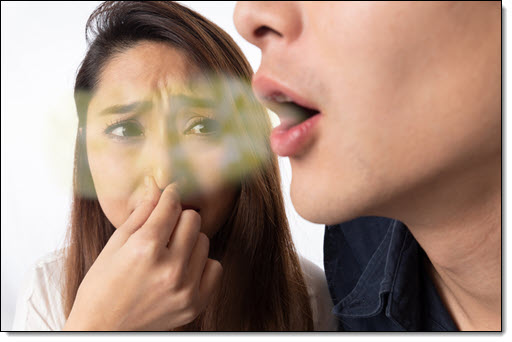Halitosis, also known as chronic bad breath, affects millions of people worldwide. It can cause embarrassment and anxiety. Unlike occasional bad breath, halitosis persists even after brushing or rinsing. The condition often signals an underlying oral health problem. Learning the causes and prevention methods can help restore fresh breath and confidence.
Common Causes of Halitosis
 Bacteria in the mouth produce foul-smelling sulfur compounds. These bacteria thrive in plaque and leftover food particles. Poor oral hygiene allows them to multiply quickly. Gum disease is another major cause of halitosis. As gums pull away from teeth, deep pockets form and trap bacteria. Tooth decay and infected tonsils may also contribute to the odor.
Bacteria in the mouth produce foul-smelling sulfur compounds. These bacteria thrive in plaque and leftover food particles. Poor oral hygiene allows them to multiply quickly. Gum disease is another major cause of halitosis. As gums pull away from teeth, deep pockets form and trap bacteria. Tooth decay and infected tonsils may also contribute to the odor.
Dry mouth, or xerostomia, reduces saliva production. Saliva helps cleanse the mouth and remove bacteria. Without enough saliva, bad breath can develop. Certain foods like garlic and onions release strong odors during digestion. Tobacco products, alcohol, and coffee can worsen the smell. Medical issues such as sinus infections or acid reflux may also cause halitosis.
Simple Steps to Prevent Halitosis
Brush your teeth twice a day using fluoride toothpaste. This removes plaque and bacteria from tooth surfaces. Don’t forget to brush your tongue, where bacteria often collect. Replace your toothbrush every three months or after illness.
Floss daily to remove food and plaque between teeth. Use an antimicrobial mouthwash to rinse away lingering particles. Drink plenty of water throughout the day to maintain healthy saliva flow. Chewing sugar-free gum can also help stimulate saliva production.
Eat a balanced diet and limit odor-causing foods. Avoid tobacco, which dries your mouth and leaves lingering smells. Reduce alcohol and caffeine consumption, as both dry the mouth.
Visit your dentist regularly for exams and cleanings. They can detect and treat early signs of gum disease or decay. Professional cleanings remove tartar buildup that brushing can’t reach. If bad breath persists, your dentist may check for underlying health issues.
Additional Tips for Fresh Breath
Clean dentures or dental appliances daily. Bacteria can collect on these surfaces and cause bad breath. Store them properly and soak them overnight in a dentist-recommended cleaner.
Scrape your tongue with a tongue scraper or toothbrush. This simple step helps remove bacterial buildup. Keep a small bottle of mouthwash handy for quick refreshers throughout the day.
Stay Consistent
Consistent oral hygiene is key to preventing halitosis. Daily care, smart dietary choices, and regular dental visits make a big difference. With the right habits, you can enjoy fresh breath and a healthier smile every day. Schedule your appointment with us today for fresher breath and a brighter smile.


